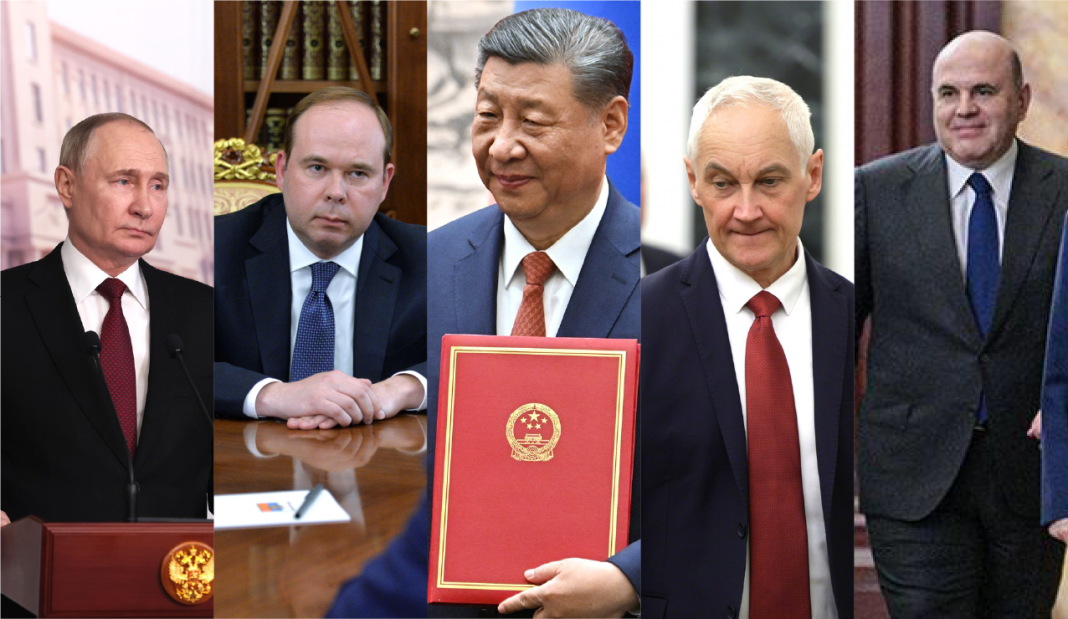This report presents key events that had an important impact on political, economic and social processes within Russia.
According to the results of the past week the following tendencies can be defined in the following theses:
- Despite the anxious meeting organized by the Chinese leader to Vladimir Putin, the result of Putin’s visit to Beijing and Harbin was more than modest. Putin failed to get Xi Jinping to sign an agreement on the construction of the Power of Siberia-2 gas pipeline (Deputy Prime Minister Alexander Novak is tasked with additional negotiations with China on this issue). It was also not possible to agree on the full resumption of financial transactions, the transition to an exclusively national currency in mutual settlements and the gradual «dedollarization” of the economy. The agreements that the two sides signed (on the protection of Ussuri tigers, on the denunciation of long-lost treaties, on beef and topinambur exports, on cross-border initiatives) are clearly not the package Putin had hoped for. What is important, however, is that Xi has shown that he will not buckle to Western pressure and abandon military-technical cooperation with Russia. The decision to conduct joint military exercises is indicative. It seems that China is deliberately keeping Russia at a certain distance, bringing it closer from time to time and making it clear that the parties have partnership relations, and China does not need allies (China recognizes two states – either partnership or vassalage of another state, but not alliance).
- In the context of personnel changes in the Presidential Administration, the most important changes were the arrival of Nikolai Patrushev as Assistant to the President and the appointment of Maxim Oreshkin as Deputy Head of the Administration. These appointments show that the Administration has been strengthened and the President will control the executive vertical of power and the processes in the country as a whole even more through his Administration. Another important appointment was the long-awaited transfer to Moscow of former Tula Region Governor Alexei Dyumin, a former presidential security guard and the man who informally supervised the Special Operations Forces and private military companies. Experts point to the strengthening of the role of presidential aide Igor Levitin. Otherwise, the Administration and its structural subdivisions have not undergone significant changes.
- The biggest sensation was the appointment of Andrei Belousov, a man far removed from the defense sector and an economist, to the post of Defense Minister. Obviously, Belousov is tasked with putting the army in order, especially with regard to logistical and financial support, to stop corruption and abuses. The transfer to Moscow of a number of governors (Alikhanov, Tsivilev, Starovoit, Degtyarev) was supposed to demonstrate the existence of social elevators. Overall, Putin decided to balance the interests of several groups, especially the Kovalchuk’s and Chemezov’s. The strengthening of Mishustin by the “practitioner” Manturov is also indicative: Chemezov, despite the predictions of skeptics, has strengthened his apparatus positions.
This digest looks at the following issues that were most relevant to Russia from May 13th through May 19th:
- Vladimir Putin’s interview with Xinhua news agency;
- Vladimir Putin’s visit to China;
- Personnel reshuffle in the Presidential Administration of the Russian Federation;
- Approval of the new Government of the Russian Federation;
- Meeting with the permanent members of the Security Council;
- Vladimir Putin’s meeting with commanders of troops of military districts;
- Meeting on the development of the defense industry complex;
- Telephone conversation between Vladimir Putin and President of Kazakhstan Kassym-Jomart Tokayev;
- Vladimir Putin’s meeting with Alexander Kurenkov and Alexander Kozlov.
This Content Is Only For Subscribers
- Vladimir Putin’s interview with Xinhua news agency
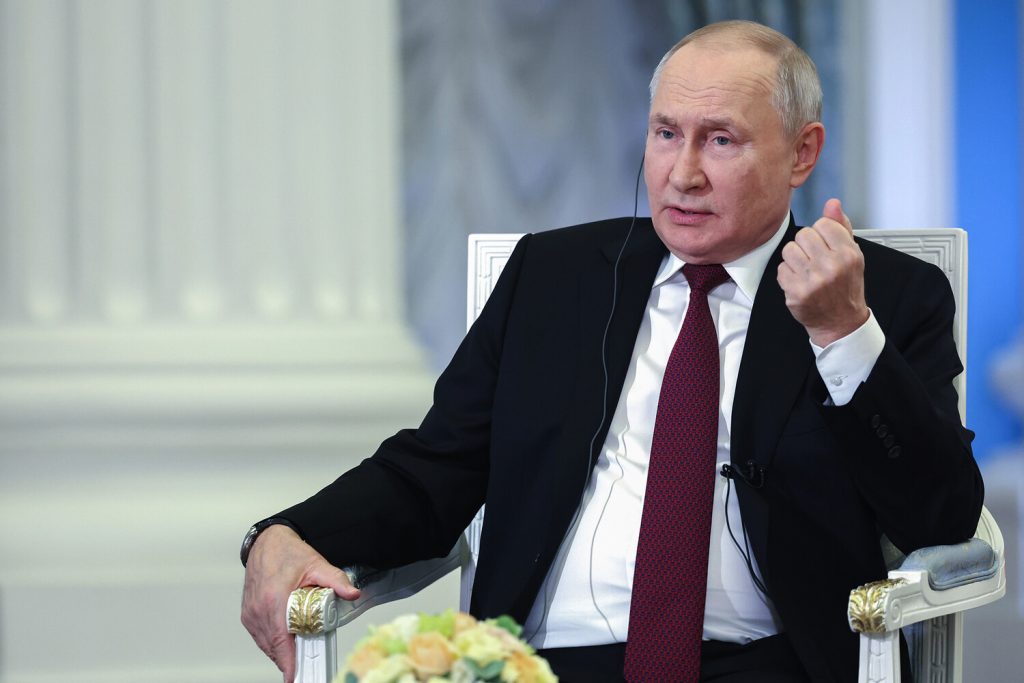
On Wednesday, May 15, ahead of Vladimir Putin’s visit to China, China’s Xinhua news agency published an interview with the Russian president in which he answered questions about bilateral relations and prospects for further development. In general, such interviews are traditional, and their main purpose is to publicly shape the main agenda of the upcoming visit.
Key Abstracts:
- “I am glad to have the opportunity to address the multi-million audience of Xinhua, one of the world’s leading and most authoritative news agencies, and to share my vision of the prospects for the Russia-China partnership. I would like to emphasize that it has always been and remains based on the principles of equality and trust, mutual respect for sovereignty and consideration of each other’s interests, and a special and significant role in the development of our relations has been played by wise and far-sighted politicians and statesmen, such as President Xi Jinping of the People’s Republic of China”.
- “The current year is a special year for our countries. October 1 marks the 75th anniversary of the founding of the People’s Republic of China. The country is approaching this significant historical date with outstanding achievements that please us as longtime and reliable, time-tested friends. The USSR was the first to recognize the People’s Republic of China on the second day of its existence. So in early October we will also celebrate the 75th anniversary of the establishment of diplomatic relations”.
- “It is important that modern Russian-Chinese ties are independent of ideology and political conjuncture. Their multifaceted development is a conscious strategic choice based on a broad convergence of fundamental national interests, deep mutual trust, strong public support and sincere friendship between the peoples of the two countries. We are talking about joint efforts to strengthen sovereignty, protect territorial integrity and security. And in a broader sense, we are talking about promoting the development and prosperity of Russia and China by increasing equitable and mutually beneficial cooperation in the economic and humanitarian spheres and strengthening foreign policy coordination in the interests of building a just multipolar world order. All this predetermines the successful future of our comprehensive and strategic partnership in the new era”.
- “Trade and economic relations between our countries are developing rapidly, demonstrating stable immunity to external challenges and crisis phenomena. Over the past 5 years, we have managed to double the Russian-Chinese trade turnover: if in 2019 it amounted to 111 billion dollars, last year it already reached 227.8 billion dollars. At the same time, more than 90 percent of settlements between our companies are made in national currencies. Therefore, it would be more correct to say that bilateral trade now amounts to about 20 trillion rubles, or almost 1.6 trillion yuan. China has been our main business partner for 13 years, and in 2023 Russia rose to the 4th place in the ranking of China’s commercial counterparties”.
- “Russia and China have been inseparably linked for centuries, not only by a common long border, but also by close cultural and human ties. In the distant past, some information about China penetrated into our country thanks to merchants. Then the first embassies appeared, the Russian Spiritual Mission in Beijing was organized, which made a truly invaluable contribution to the collection and systematization of knowledge about China. Already in the 19th century, the study of the Chinese language began in Russia, later chairs were established at Russian universities, and dictionaries were compiled.
- “Russia, like China, stands firmly on the principles of multiculturalism, advocates their equality and preservation of national identity. These and other important issues were the focus of the St. Petersburg International Cultural Forum held in 2023. A representative Chinese delegation took a very active part in it. The free discussions held at the forum are particularly important now, as they contribute to building a respectful dialogue between civilizations”.
- “Russia’s BRICS Chairmanship has gained a steady momentum. Full-scale work has been carried out in all three main areas of cooperation: politics and security, economy and finance, culture and humanitarian contacts. Undoubtedly, one of the main goals of the Russian Chairmanship is the organic integration of the new members into BRICS. We are actively helping them to integrate into the established network of cooperation mechanisms.
- “The Earth is the cradle of humanity, our common home, and we are all its equal inhabitants. I am sure this view is shared by the majority of people on the planet. However, the countries that count themselves among the so-called golden billion do not seem to think so. Western elites, led by the United States, refuse to respect civilizational and cultural diversity and reject traditional values that have been formed over centuries. In an attempt to maintain their global dominance, they have arrogated to themselves the right to tell other nations with whom they can be friends and cooperate and with whom they cannot. They deny them the right to choose their own models of development. They do not consider their sovereign interests. As in past times, they seek to ensure their own well-being at the expense of other States and resort to neo-colonial methods to do so.
- “We positively assess China’s approaches to resolving the Ukrainian crisis. Beijing perfectly understands its root causes and global geopolitical significance, which is reflected in the 12-point plan “China’s Position on the Political Settlement of the Ukrainian Crisis” published in February 2023. The ideas and proposals recorded in the document testify to the sincere desire of our Chinese friends to help stabilize the situation”.
- “As for Chinese President Xi Jinping’s recently articulated additional four principles for conflict resolution, they seamlessly complement the aforementioned plan. The realistic and constructive steps proposed by Beijing – to achieve peace by refraining from pursuing vested interests and constantly raising the degree of tension, by minimizing the negative impact of the conflict on the world economy and the stability of global industrial supply chains – develop the ideas of the need to overcome the Cold War mentality, the indivisibility of security, compliance with international law and the UN Charter in their entirety and interconnectedness. Therefore, they could form the basis of a political and diplomatic process that would take into account Russia’s security concerns and contribute to the establishment of a long-term and sustainable peace”.
- “Russia is ready for negotiations, moreover, we have been conducting these negotiations. On April 15, 2022 in Istanbul, together with the Ukrainian delegation, we prepared a draft of a future peace agreement taking into account the requirements of the Ukrainian delegation, including the issues of ensuring Ukraine’s security in the future. Moreover, the head of the Ukrainian delegation initialed the main provisions of the draft document. Our Western partners convinced us that conditions must be created for the final agreement and signing of this agreement. And the main thing is to withdraw Russian troops from the capital of Ukraine – from Kyiv. We have done this. However, instead of signing a peace agreement, the Ukrainian side suddenly announced the termination of negotiations. As Ukrainian officials later stated, this was also because their Western allies recommended that they continue fighting and work together to strategically defeat Russia. We have never abandoned the negotiations”.
- “Today Russia is among the five largest countries in the world in terms of purchasing power parity. Now we set a goal to become one of the four largest economies in the world. At the same time, the quality and efficiency of development in all spheres and the growth of the well-being of our citizens are of primary importance to us”.
Totals/Predictions:
There is a tradition in Russian-Chinese relations: on the eve of a visit by the leader of Russia to China or China to Russia, one of the most influential publications publishes an interview or a lengthy article by a high-ranking guest with his views on the state and prospects of interstate relations. Putin did not break the tradition and actually outlined the main goals of his visit in his interview with Xinhua. Especially because they were repeated once again during the final press conference. Of particular interest is the fact that Putin actually fully agreed with China’s foreign policy doctrines and once again emphasized his readiness to negotiate with Ukraine (but on his own terms). At the same time, he emphasized that his position on this issue is fully consistent with that of China.
- Vladimir Putin’s visit to China
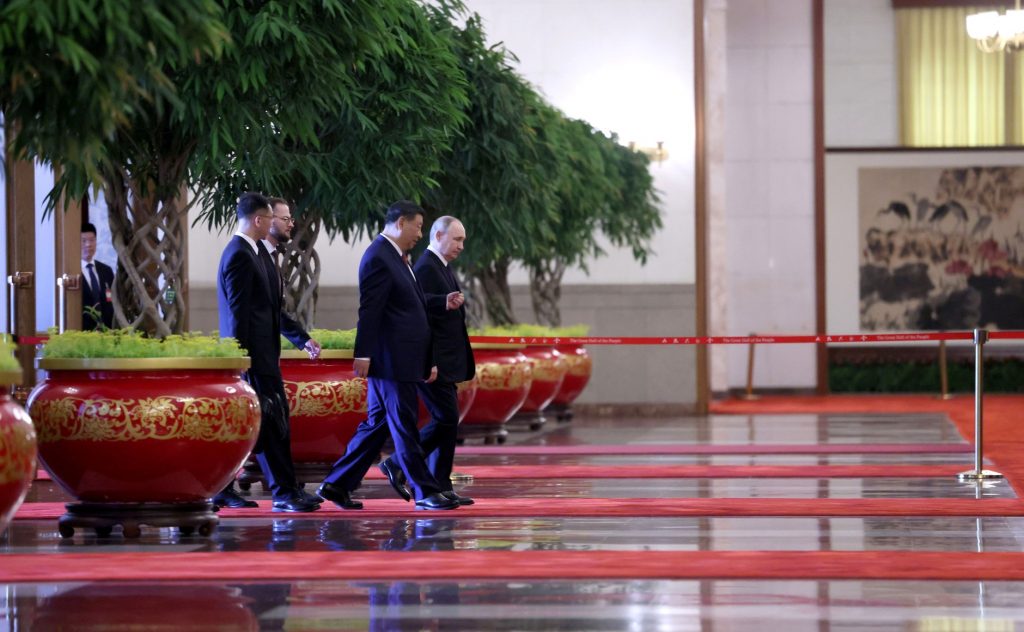
On Thursday, May 16, Vladimir Putin arrived in China on a two-day state visit at the invitation of Chinese President Xi Jinping. During the visit, the Russian president had time to visit Beijing and Harbin, as well as hold official talks with the PRC leader, participate in a number of events, and hold meetings with other senior PRC officials.
Immediately upon Putin’s arrival in Beijing, the Russian president was officially welcomed by Chinese President Xi Jinping, during which the two heads of state introduced members of their delegations, followed by the first official conversation between the two leaders during the current visit at the House of People’s Congresses.
Following the talks, the two leaders signed a joint statement on deepening the relations of comprehensive partnership and strategic cooperation entering a new era in the context of the 75th anniversary of the establishment of diplomatic relations between the two countries.
Main points of the joint statement:
- “The sides note that modern Russian-Chinese relations represent a more advanced form of interstate interaction compared to the military-political alliances of the Cold War era, are not of a bloc and confrontational nature, and are not directed against third countries.”
- “Under the conditions of international turbulence, Russian-Chinese relations are passing the tests of rapid changes in the world with dignity, demonstrating strength and stability, and are experiencing the best period in their history. The Parties emphasize that the development of Russia-China relations of comprehensive partnership and strategic cooperation, which are entering a new era, meets the fundamental interests of the two states and their peoples and is not based on short-term interests or opportunistic calculations.”
- “The relationship between the two countries has strong internal driving force and independent value. The two sides are determined to uphold their legitimate rights and interests, resist any attempts to hinder the normal development of bilateral ties, interfere in the internal affairs of the two countries, or limit the economic, technological or foreign policy potential of Russia and China.”
- “China welcomes the successful presidential elections of the Russian Federation held in March 2024 and believes that they were held at a high organizational level, were open, objective and nationwide, and their results convincingly demonstrate broad support for the state policy pursued by the Russian authorities, an important part of the external course of which is the development of friendly relations with the People’s Republic of China.”
- “The Chinese Party categorically condemns all organizers, perpetrators and accomplices of the inhumane terrorist act committed on March 22, 2024 in the Moscow region, declares the absolute unacceptability of attacks against civilians and supports the Russian Party’s resolute actions aimed at combating terrorist and extremist forces and maintaining peace and stability in the country.”
- “The Russian Party reaffirms its commitment to the “One China” principle, recognizes that Taiwan is an integral part of China, opposes Taiwan’s independence in any form, firmly supports the actions of the Chinese Party to protect its own sovereignty and territorial integrity, and to unify the country. The Chinese Party supports the efforts of the Russian Party to ensure security and stability, national development and prosperity, sovereignty and territorial integrity, and opposes outside interference in Russia’s internal affairs”.
- “The Parties note the growing dynamics of the ongoing global changes, strengthening of positions and growth of real opportunities of the states of the Global South and regional leader countries. The contours of a polycentric world order are becoming increasingly clear. Such objective factors accelerate the redistribution of potential, resources and development prospects in favour of emerging markets and developing countries, and contribute to the democratization of international relations and international justice”.
- “The Sides oppose interference in the internal affairs of sovereign countries, the imposition of unilateral sanctions without international legal grounds and not approved by the UN Security Council, as well as the extraterritorial application of national law and the drawing of ideological dividing lines. The Sides note that neo-colonialism and hegemonism are completely contrary to the trends of the time, and call for equal dialogue and the development of partnerships to promote contacts and exchange of experience among civilizations.”
- “The Parties will continue to firmly uphold the inviolability of the outcome of the Second World War and the established post-war world order enshrined in the UN Charter, as well as oppose attempts to deny, distort and falsify the history of the Second World War. The Parties note the importance of proper historical education, preservation and inadmissibility of desecration or destruction of memorials of the World War against Fascism and strongly condemn actions to glorify Nazism and militarism, as well as attempts to revive them. In this context, the Sides intend to commemorate with dignity the upcoming 80th anniversary of the Victory of the Soviet Union in the Great Patriotic War and the Victory of the War of Resistance of the Chinese People against Japanese Aggression in 2025, and to jointly promote an accurate interpretation of the history of the Second World War”.
- “The parties note with satisfaction the progressive advancement and positive results of Russia-China practical interaction in all spheres, reaffirm their readiness to continue to deepen multidimensional cooperation and close coordination based on the principle of mutual benefit, jointly overcome external challenges and unfavorable factors, enhance the effectiveness of bilateral cooperation in the interests of its stable and high-quality development.”
- “The Sides reaffirm the desire to promote a more just and sustainable multipolar world order, as well as strict respect for and adherence to the purposes and principles of the UN Charter in their entirety and interrelatedness, and to protect genuine multilateralism. The Sides attach particular importance to the need to further revitalize the activities of the Group of Friends in defense of the UN Charter”.
- “The two sides consider joint work within the framework of the Shanghai Cooperation Organization as an important direction for deepening the relations of comprehensive partnership and strategic interaction between the two states. They will continue coordinated efforts to further develop the SCO as a credible and influential multilateral association, enhance its role in shaping a new just, sustainable and multipolar world order.”
- “The Sides note with concern that the current international security situation is characterized by growing conflict at the regional and global levels, general instability, as well as increased strategic risks as a result of the aggravation of interstate contradictions, including between nuclear powers.”
- “Reaffirming the commitment to the Joint Statement of the Leaders of the Five Nuclear-Weapon States on Preventing Nuclear War and Avoiding an Arms Race of January 3, 2022, and above all the determination that there can be no winners in a nuclear war and it should never be fought, the Parties reiterate their call on all countries parties to this instrument to follow its provisions in practice.”
- “The Russian side positively assesses China’s objective and unbiased position on the Ukrainian issue and shares the approach that conflicts should be resolved on the basis of the UN Charter in its entirety and totality.”
- “The Russian side welcomes the willingness of the Chinese side to play a constructive role in the issue of political and diplomatic settlement of the Ukrainian crisis.”
- “The sides note the need to stop any steps contributing to the prolongation of hostilities and further escalation of the conflict, call for preventing its transition into an uncontrolled phase, and emphasize the importance of dialogue as the best form of resolving the Ukrainian crisis.”
- “The sides proceed from the premise that a sustainable resolution of the Ukrainian crisis requires addressing its root causes and adhering to the principle of indivisibility of security, taking into account the legitimate security interests and concerns of all countries.”
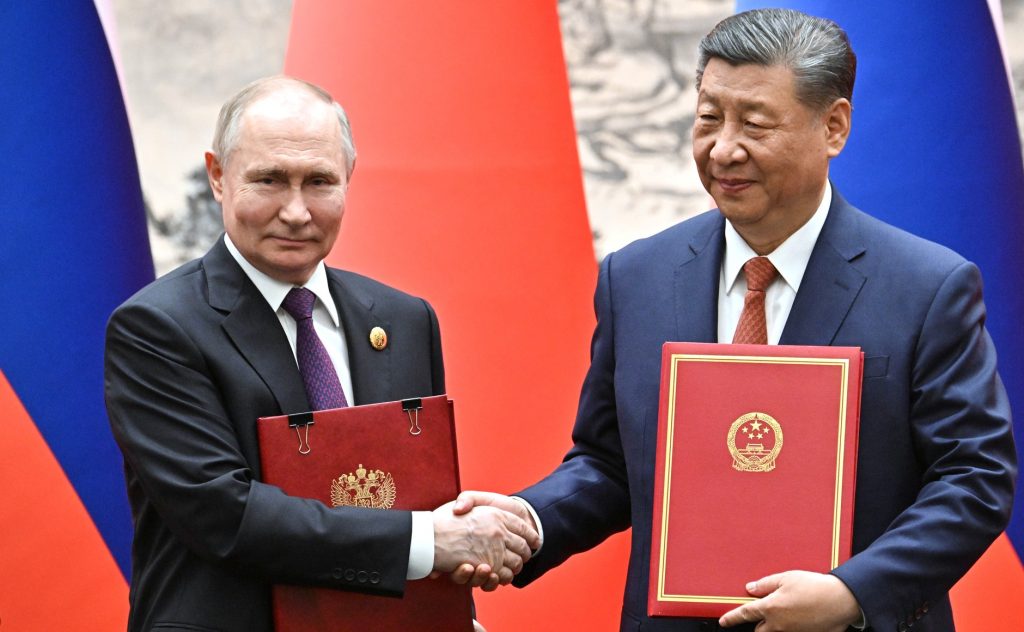
Following the talks, Xi Jinping and Vladimir Putin took part in a joint press conference, during which they noted the first results of the visit and made statements on the results of the talks.
Key Abstracts:
- Xi Jinping: “China and Russia have set an example to others of building a new type of interstate relations and relations between large neighbors. All of this has been made possible because both sides are committed to the following five principles.
- Xi Jinping: “The first is to firmly support each other on issues related to the core interests of both sides on the basis of mutual respect. President Putin and I are united in the belief that we have succeeded in developing a new model for the development of relations between major and neighboring states precisely on the basis of respect, equality, and mutual strong support on issues representing each other’s core interests and pressing concerns.”
- Xi Jinping: “The second is to adhere to win-win to forge a new architecture of mutually beneficial cooperation. Last year, our trade turnover exceeded 240 billion U.S. dollars, up nearly 2.7 times from a decade ago.”
- Xi Jinping: “Third. Adhere to centuries-old friendship and pass the torch of this friendship from generation to generation. China and Russia are famous for their ancient history and brilliant culture. The works of Pushkin and Tolstoy are read in ordinary Chinese families. Traditional Chinese culture in the form of Beijing opera and Taijiquan is very popular among the Russian people”.
- Xi Jinping: “Fourth. In the spirit of strategic cooperation, promote differences in global governance in the right direction. China and Russia firmly uphold a centered international system and a world order based on international law, closely coordinate positions in multilateral forums such as the United Nations, APEC and the G20, and promote the establishment of a multipolar world and economic globalization through genuine multilateralism.
- Xi Jinping: “Fifth. Promote political settlement of hotspot issues for the sake of truth and justice. The cold war mentality is still rampant in today’s world. Unilateral hegemony, bloc confrontation and power politics directly threaten world peace and the security of all countries.”
- Xi Jinping: “The Chinese side hopes for the early restoration of peace and stability on the European continent and is willing to continue its constructive role. The Chinese people say: the crust is formed by the accumulation of earth, and the ocean is formed by the accumulation of water. Through 75 years of efforts, the centuries-old friendship and all-round cooperation between China and Russia form a powerful force to overcome difficulties and conquer new peaks.”
- Putin: “In a warm, friendly and constructive atmosphere, today we discussed with President Xi Jinping the state and prospects of bilateral cooperation. They noted with satisfaction the intensity of dialog in the areas of politics and security, the high and progressive dynamics of economic exchanges, the expansion of humanitarian contacts, and effective coordination in the international arena.”
- Putin: “Russian-Chinese cooperation in the energy sector is not limited only to hydrocarbons. Cooperation in the peaceful atom is being strengthened. Rosatom is building Russian-designed power units at Tianwan NPP and Xudapu NPP in China. Their commissioning will make a significant contribution to the energy supply of the Chinese economy and will help supply Chinese enterprises and households with inexpensive and clean energy”.
- Putin: “In turn, with the assistance of Chinese partners, the NICA gas pedal complex is being built in the city of Dubna near Moscow on the basis of the Joint Institute for Nuclear Research. Experiments at this collider will make it possible to realize breakthrough mega-science projects that are beyond the capacity of any country in the world alone”.
- Putin: “Russia and China are vigorously developing cultural and humanitarian cooperation. As already mentioned, the years 2024-2025 have been declared “cross cultural” years in our countries. Their official start will be given this evening. The program of the “cross-cultural” years is very extensive: it includes many diverse cultural events to be held in 38 cities of Russia and 51 cities of China. Among them are festivals and fairs, theater tours and ice shows, museum exhibitions, film screenings and much more”.
- Putin: “Both countries pursue an independent and autonomous foreign policy. We are working in solidarity to create a more just and democratic multipolar world order, which should be based on the central role of the United Nations and its Security Council, international law, cultural and civilizational diversity, and a balance of interests of all participants in the global community.
- Putin: “We believe it is necessary to work towards building a reliable and adequate security architecture in the Asia-Pacific region, in which there is no place for closed military-political alliances. We believe that the creation of such alliances is very harmful and counterproductive.”
On the same day, Vladimir Putin held a meeting with Li Qiang, Premier of the State Council of the People’s Republic of China. The parties also discussed topical bilateral relations between the two states.
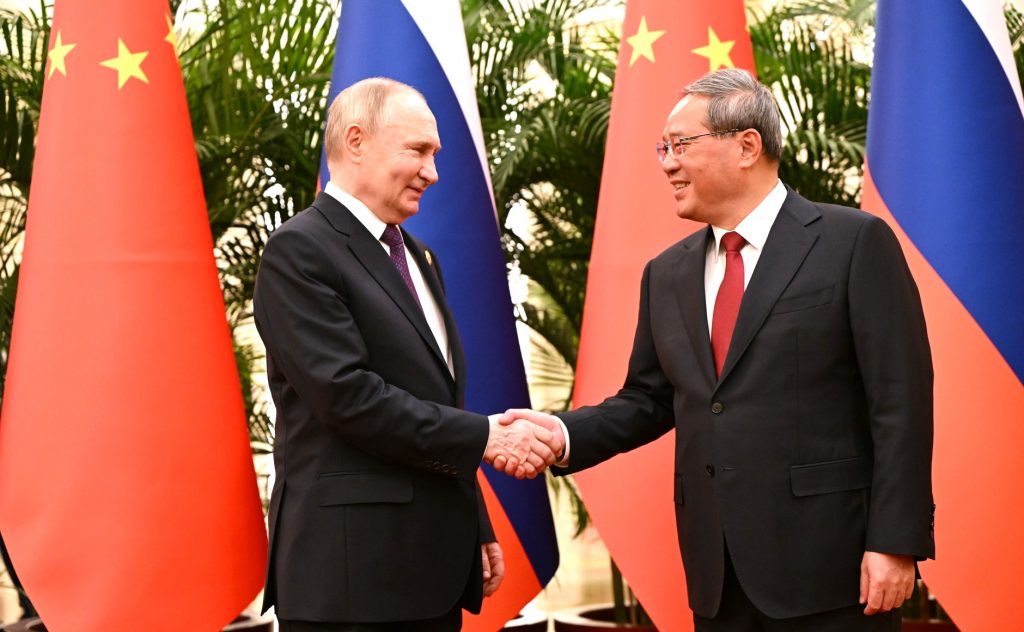
Key Abstracts:
- Putin: “Over seven and a half decades, Russian-Chinese relations have been developing dynamically and have reached an unprecedentedly high level. They are built on a solid foundation of good-neighborliness, equality, mutual respect and support. It is precisely this strategic course that meets the fundamental interests of the peoples of Russia and China”.
- Putin: “The key core area of cooperation is energy. Russia is a reliable supplier of energy carriers for the growing Chinese economy. By the way, last year we achieved a record level of supplies of Russian oil, gas and coal to friendly China.
- Putin: “We are expanding cooperation in industry, including the automotive industry, and increasing trade turnover in agriculture. Plans have been agreed and are being implemented in the sphere of high technologies and innovations, including space and nuclear energy. There are tangible results in the construction of transportation infrastructure.
- Putin: “Humanitarian ties are deepening. We are implementing numerous measures, road maps of humanitarian cooperation until 2030 in the spheres of education, culture, health care, sports, mass media, cinematography, tourism, archives and youth policy”.
Vladimir Putin also took part in a wreath-laying ceremony at the monument to the People’s Heroes of China, after which he headed to the State Bolshoi Theater of China, where he and Chinese President Xi Jinping opened the “cross-cultural” years of Russia and China.
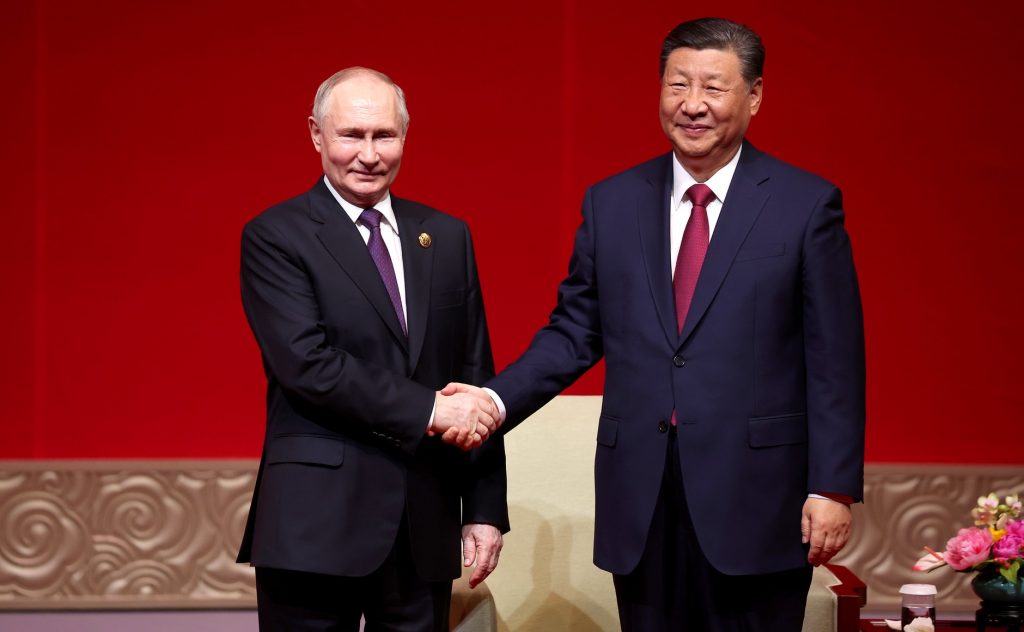
Key Abstracts:
- Xi Jinping: “Last year, President Putin and I agreed to declare 2024-2025 the China-Russia Culture Years. I am confident that the cycle of colorful events starting today will serve as an additional impetus for the development of the centuries-old Sino-Russian friendship and strengthening mutual understanding between our peoples”.
- Xi Jinping: “As one of the good traditions of the cultural and humanitarian ties between China and Russia, the thematic years represent a characteristic feature and a prominent moment in the annals of bilateral relations and enjoy very wide popularity among the peoples of our countries. The ninth cross-cultural year organized by the two countries includes a variety of interesting events of humanitarian exchanges, which help to tap the potential of bilateral cultural cooperation and open up new horizons of cultural and humanitarian ties between China and Russia”.
- Putin: “Our country also provided large-scale assistance at the initial stage of the establishment of the new Chinese state and helped strengthen its independence and sovereignty. We are, of course, delighted that the Chinese people, under the leadership of the Communist Party, have been able to achieve such impressive success in developing their country. To fill their ancient civilization with powerful vitality.”
- Putin: “It is highly symbolic that such a large-scale joint project as the Russian-Chinese Years of Culture is timed to coincide with the anniversary of Russian-Chinese relations. The program of the “cross-cultural” years is very extensive: it includes tours of the capital and regional theaters, circus and film festivals, museum and library exhibitions and forums, cultural and art fairs, and sports competitions.”
On Friday, May 17, Vladimir Putin arrived in Harbin, where he took part in the ceremony of laying flowers at the monument to Soviet soldiers, inspected Russian and Chinese exhibition stands within the VIII Russian-Chinese EXPO taking place in Harbin on May 17-21, and visited the Church of the Protection of the Blessed Virgin Mary in Harbin. Also, as part of Putin’s visit to Harbin, he had a conversation with Deputy Chairman of the People’s Republic of China Han Zheng.
At the end of the official events, Vladimir Putin visited Harbin Polytechnic University and held a meeting with Chinese and Russian students and teachers of the university.
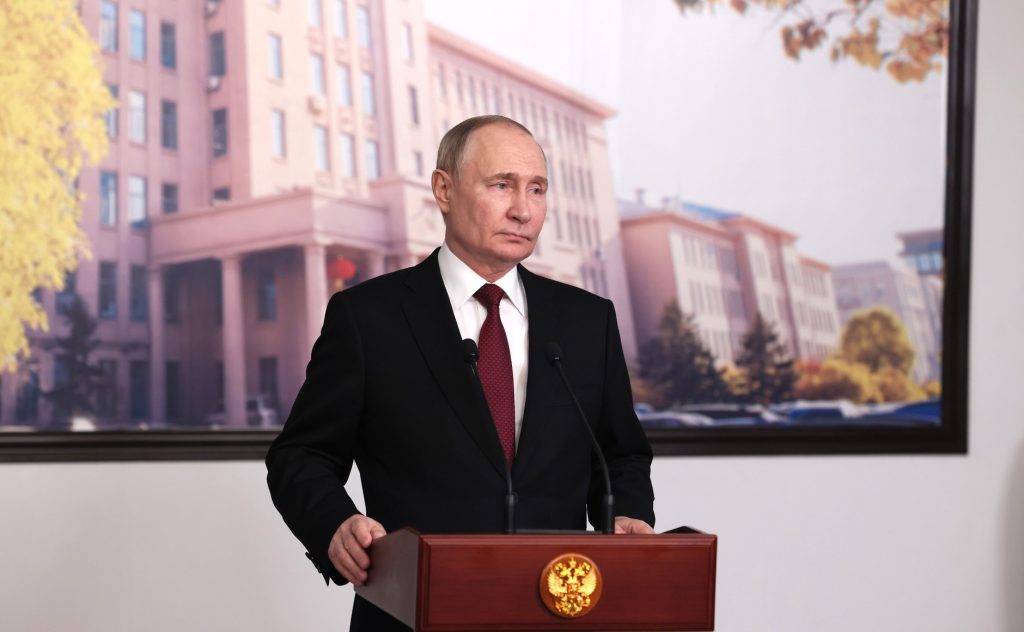
Key Abstracts:
- “If you put the grain in the right direction, treat it with care, it gives such good sprouts: from a small school, aimed at training personnel, which the country needed at that time, grew such a wonderful, large institution of higher education, which is developing rapidly and meets all the today requirements.”
- “During yesterday’s talks with President Xi Jinping, we were pleased to note that scientific and educational cooperation occupies one of the priority places in the development of the entire complex of Russian-Chinese relations, comprehensive partnership and strategic cooperation – these words, to which I would also like to draw attention to, make a lot of sense: it is comprehensive partnership and strategic cooperation, interaction. This is clearly evidenced by the concrete steps we are taking and the results we are achieving.
- “Harbin University is a forge of personnel for the nuclear industry of the People’s Republic of China. And, by the way, its graduates are actively involved in the implementation of Rosatom’s projects to build Russian-designed power units at the Tianwan NPP and the Xudapu NPP in China.
- “Currently, the scientific communities of the two countries are working on technical solutions that will radically reduce carbon emissions. A program to create so-called carbon polygons is being implemented. We are already implementing these projects in Russia. Technologies to reduce the hydrocarbon footprint are being tested. Joint activities are planned in terms of certification of “green” electricity, hydrogen and wind power”.
Following his two-day state visit to China, Vladimir Putin took part in a conference where he answered questions from Russian and Chinese journalists.
Key Abstracts:
- “The status of the visit is official, but it is purely a working trip, without any doubt. From morning to evening we spent practically the whole day together with the Chairman, with his colleagues. A lot of topics were raised for discussion”.
- “Development, we believe, must be constructive, must be peaceful, without any doubt. It should take into account not only our interests, but also the interests of all participants in international communication”.
- “And of course, we need to strengthen the emerging multipolar world. There is no doubt that it is now taking shape before our eyes, that the world is becoming multipolar. I think that everyone understands this very well and is aware of it. And it is important that those who are trying to maintain their monopoly on decision-making in the world on all issues, realizing this – and I think they understand it perfectly well, and I don’t think they do, I know they understand it perfectly well – that they, realizing this, do everything that depends on them in this case, so that this process would be natural, I repeat once again, peaceful, conflict-free and that the opinions of all participants in the international process would be fully taken into account, so that we would all look for compromises in the rather difficult decisions that we are all facing.
- “The topic of resolving the Ukrainian crisis was touched upon. The President of the People’s Republic of China outlined to me the main theses of what was discussed during his recent trip to Europe, outlined his position related to Chinese peace initiatives. We have repeatedly said, we believe that China is sincerely seeking to resolve this problem, offering various options, behaving very flexibly and, in my opinion, sincerely seeking to resolve this problem. We have discussed this in quite a lot of detail.”
- “As for our counter-partners, so to speak, in this case it concerns the Ukrainian leadership and its overseas masters first of all, the European ones – well? We have talked about this many times. When our troops were standing near Kiev, we were told by our Western partners: you cannot sign documents if you have a gun to your temple from the opposite side. “What should be done?” – from our side we asked. “We have to withdraw troops from Kiev.” We did so. The next day they threw all our agreements in the trash and said: well, now we’ll fight to the end. And their Western handlers took the position now known to the whole world: to defeat Russia on the battlefield, to inflict a strategic defeat on it.
- “So let’s draw a line under this part of the answer to your question: we have once again been deceived. Now we have to understand who and how we should deal with, can deal with, who and to what extent we can trust”.
- “We are, of course, now analyzing everything that is happening in this regard in this direction, looking, of course, at what is happening around the meeting announced by everyone in Switzerland, in Geneva – I think they are meeting there. Of course, we are not going to discuss any formulas that we do not know.
- “But we never refused to negotiate, unlike the Ukrainian side. They are the ones who withdrew from the negotiation process, they announced that they were going to inflict a strategic defeat on us. And they said about ‘we will fight to the end,’ actually, not to the end, but to the last Ukrainian. They did it all with their own hands.
- “We have the basis for the negotiation process, what we agreed on in Istanbul, and what the head of the Ukrainian delegation actually signed under, under an excerpt from this voluminous document. He initialed it. We have the document lying around, with his signature on it. What other additional conditions are there that we have never heard of, that we know nothing about?
- “As for what is happening in the Kharkiv direction, this is also their fault, because they shelled and continue, unfortunately, to shell residential neighborhoods in the border areas, including Belgorod. Civilians are dying there, it’s obvious. They are shooting directly at the city center, at residential neighborhoods. I have said publicly that if this continues, we will be forced to create a security zone, a ‘sanitary zone’. This is what we are doing.
- “Tertiary sanctions, or against third countries – participants in economic activity, are of course doubly or triply illegitimate, because if they are adopted without a decision of the UN Security Council, they are generally illegitimate. And with regard to third countries, this is completely beyond common sense.
- “We have been conducting painstaking negotiations for a long time, almost a month and a half, first in Minsk, then in Istanbul, and we have reached certain compromises. The Ukrainian side has signed an extract from these documents. It is a thick, healthy document in itself, but the extract – the issues of principle outlined were initialed by the Ukrainian side. But we have been working on it. Now we have some formulas based on what? On “wishes”, not on the real situation. It is impossible to discuss this.
- “But we are open to discussion. We’ve never said no. I just said, it’s not a joke, I didn’t invent anything. As soon as the troops were withdrawn, the Westerners immediately told Ukraine: do not sign, fight. They took it under the hood, they are doing it. And we were immediately told: now we will fight to the last man. That’s what we were told. There will be no more negotiations.
- “We used to communicate with him [Vladimir Zelensky] before, we were in constant contact before the conflict went into an acute phase of armed struggle.”
- “Regarding legitimacy. This question must first of all be answered by the political and legal systems of Ukraine itself. There are all sorts of options there in the Constitution. This is a question of assessment. This assessment, of course, first of all should be made by the Constitutional Court and in general, I would even say so, by the political system of Ukraine itself. But for us, of course, it matters, because if it comes to signing any documents, of course, we must sign documents in such a crucial area with legitimate authorities, this is an obvious fact. But, I repeat once again, this question must be answered by the political and legal (legal) systems of Ukraine itself.”
Totals/Predictions:
Despite the meeting organized by the Chinese leader to Vladimir Putin, the result of Putin’s visit to Beijing and Harbin was more than modest. Putin failed to get Xi Jinping to sign an agreement on the construction of the Power of Siberia-2 gas pipeline (Deputy Prime Minister Alexander Novak is tasked with additional negotiations with China on this issue). It was also not possible to agree on the full resumption of financial transactions, the transition to an exclusively national currency in mutual settlements and the gradual dedollarization of the economy. The agreements that the two sides signed (on the protection of Ussuri tigers, on the denunciation of long-lost treaties, on beef and topinambur exports, on cross-border initiatives) are clearly not the package Putin had hoped for. What is important, however, is that Xi has shown that he will not bow to Western pressure and abandon military-technical cooperation with Russia. The decision to hold joint military exercises is telling. It seems that China is deliberately keeping Russia at a certain distance, bringing it closer from time to time and making it clear that the parties have partnership relations, and China does not need allies (China recognizes two states – either partnership or vassalage of another state, but not alliance).
- Personnel reshuffles in the Presidential Administration of the Russian Federation
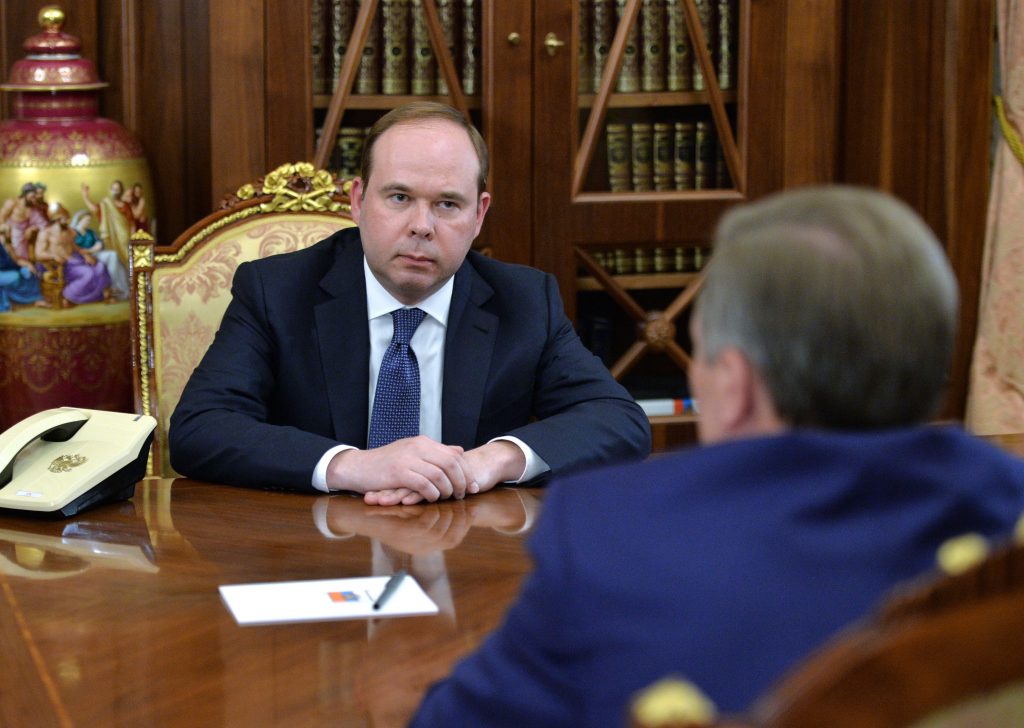
On Tuesday, May 14, Vladimir Putin signed a decree on appointments in the leadership of the Presidential Administration, thus finally approving its new composition. Despite a number of rumors, Anton Vaino remained the head of the Administration, and many other functionaries also retained their positions. According to Putin’s decree, the new leadership of the Administration is as follows:
- Anton Vaino – Head of the Presidential Administration;
- Alexei A. Gromov – First Deputy Head of the Presidential Executive Office;
- Kiriyenko Sergey Vladilenovich Kiriyenko – First Deputy Head of the Presidential Administration;
- Dmitry Nikolayevich Kozak – Deputy Head of the Presidential Administration;
- Magomedov Magomedsalam Magomedalievich – Deputy Head of the Presidential Administration;
- Oreshkin Maxim Stanislavovich – Deputy Head of the Presidential Administration;
- Vladimir Yevgenyevich Ostrovenko – Deputy Head of the Presidential Administration;
- Dmitry Sergeevich Peskov – Deputy Head of the Presidential Executive Office – Press Secretary of the President.
- Alexey Gennadyevich Dyumin – Assistant to the President;
- Vladimir Rostislavovich Medinsky – Assistant to the President;
- Dmitry Yuryevich Mironov – Assistant to the President;
- Nikolai Platonovich Patrushev – Assistant to the President;
- Yuri Viktorovich Ushakov – Assistant to the President;
- Andrei Fursenko – Assistant to the President;
- Edelgeriev Ruslan Sayd-Khusainovich – Assistant to the President;
- Larisa Igorevna Brycheva – Assistant to the President – Head of the State Legal Department of the President;
- Dmitry Rafaelievich Kalimulin – Assistant to the President – Head of the Presidential Reference Office;
- Dmitry Vladislavovich Shalkov – Assistant to the President – Head of the Presidential Control Department;
- Vladislav Nikolaevich Kitaev – Head of the President’s Protocol;
- Igor Olegovich Shchegolev – Presidential Plenipotentiary Envoy to the Central Federal District;
- Alexander Vladimirovich Gutsan – Presidential Plenipotentiary Envoy to the Northwestern Federal District;
- Vladimir V. Ustinov – Presidential Plenipotentiary Envoy to the Southern Federal District;
- Yury Yakovlevich Chaika – Presidential Plenipotentiary Envoy to the North Caucasus Federal District;
- Igor Anatolyevich Komarov – Presidential Plenipotentiary Envoy to the Volga Federal District;
- Vladimir Vladimirovich Yakushev – Presidential Plenipotentiary Envoy to the Urals Federal District;
- Anatoly Anatolyevich Seryshev – Presidential Plenipotentiary Envoy to the Siberian Federal District;
- Anton Kobyakov – Advisor to the President;
- Levitin Igor Evgenyevich – Advisor to the President (by a separate decree, Levitin was assigned the duties of Special Representative of the President for International Cooperation in Transportation);
- Valery Fadeev – Advisor to the President;
- Elena Alexandrovna Yampolskaya – Advisor to the President;
- Sergey Borisovich Ivanov – Special Representative of the President for Environmental Protection, Ecology and Transportation;
- Artur A. Muravyev – authorized representative of the President in the Federation Council of the Federal Assembly;
- Harry Vladimirovich Minkh – Presidential Plenipotentiary Envoy to the State Duma of the Federal Assembly;
- Alexander Vladimirovich Konovalov – Plenipotentiary Representative of the President in the Constitutional Court;
- Mikhail Anatolyevich Kazarinov – Deputy Head of the Presidential Protocol;
- Yury Konstantinovich Sviridov – Deputy Press Secretary of the President.
Totals/Predictions:
To a large extent, the Administration of the President of the Russian Federation has not undergone any major changes. Although on the eve of the inauguration, many predicted serious personnel changes, up to and including the dismissal of Anton Vaino, Dmitry Kozak, Yuri Ushakov, and a number of others. In fact, the most important changes were the arrival of Nikolai Patrushev as presidential aide and the appointment of Maxim Oreshkin as deputy head of the Administration. These appointments show that the Administration has been strengthened and the President will control the executive vertical of power and the processes in the country as a whole even more through his Administration. Another important appointment was the long-awaited transfer to Moscow of former Tula Region Governor Alexei Dyumin, a former presidential security guard and the man who informally supervised the Special Operations Forces and private military companies. Experts point to the strengthening of the role of presidential aide Igor Levitin. Otherwise, the Administration and its structural subdivisions have not undergone significant changes.
- Approval of the new Government of the Russian Federation
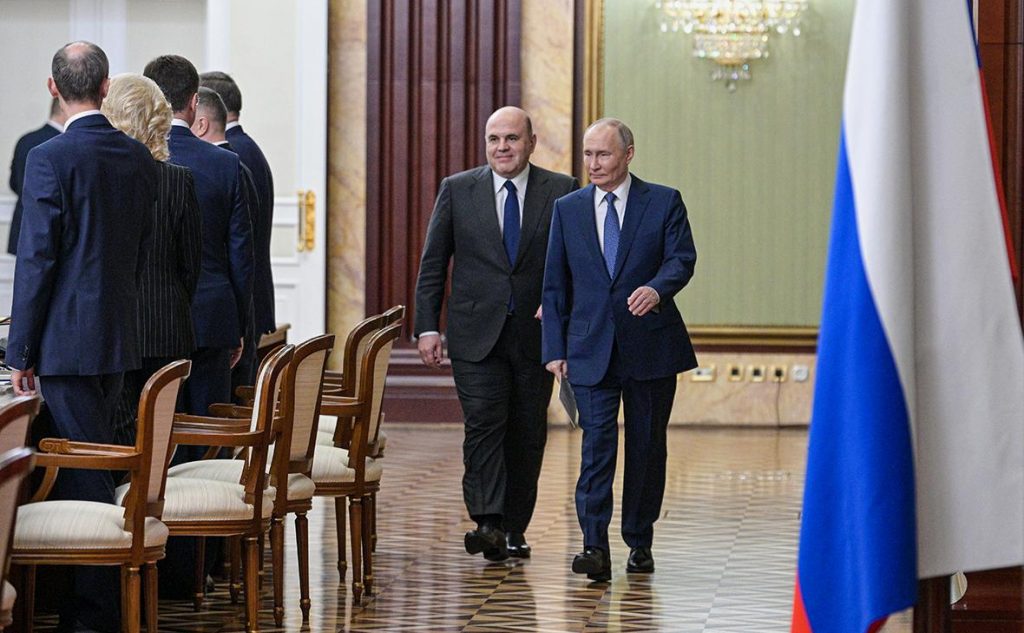
On Tuesday, May 14, Vladimir Putin signed a decree approving the new Government of the Russian Federation. As in the case of the Presidential Administration, Mikhail Mishustin retained his position as head of the government. Also, many ministers have retained their positions in the new government. However, there are a number of cardinal changes. According to the signed decree, the composition of the new Government of the Russian Federation is as follows:
- Mikhail Vladimirovich Mishustin – Chairman of the Government;
- Denis Manturov – First Deputy Prime Minister;
- Tatyana Alekseevna Golikova – Deputy Prime Minister;
- Dmitry Yurievich Grigorenko – Deputy Chairman of the Government – Head of the Government Staff;
- Alexander Valentinovich Novak – Deputy Prime Minister;
- Overchuk Alexey Logvinovich – Deputy Chairman of the Government;
- Dmitry Nikolayevich Patrushev – Deputy Chairman of the Government;
- Vitaly Gennadyevich Savelyev – Deputy Chairman of the Government;
- Yury Petrovich Trutnev – Deputy Prime Minister – Presidential Plenipotentiary Envoy to the Far Eastern Federal District;
- Marat Shakirzyanovich Khusnullin – Deputy Chairman of the Government;
- Dmitry Chernyshenko – Deputy Chairman of the Government;
- Vladimir Kolokoltsev – Minister of Internal Affairs;
- Alexander Vyacheslavovich Kurenkov – Minister for Civil Defense, Emergencies and Elimination of Consequences of Natural Disasters;
- Sergey Viktorovich Lavrov – Minister of Foreign Affairs;
- Andrei Removich Belousov – Minister of Defense;
- Konstantin Anatolyevich Chuichenko – Minister of Justice;
- Sergey Yevgenyevich Naryshkin – Director of the Foreign Intelligence Service;
- Alexander Vasilyevich Bortnikov – Director of the Federal Security Service;
- Viktor Vasilyevich Zolotov, Director of the Federal Service of National Guard Troops – Commander-in-Chief of the National Guard Troops;
- Dmitry Viktorovich Kochnev – Director of the Federal Guard Service;
- Linz Alexander Leonidovich – Head of the Main Department of Special Programs of the President;
- Murashko Mikhail Albertovich – Minister of Health;
- Olga Lyubimova – Minister of Culture;
- Valery Nikolayevich Falkov – Minister of Science and Higher Education;
- Alexander Alexandrovich Kozlov – Minister of Natural Resources and Environment;
- Anton Alikhanov – Minister of Industry and Trade;
- Kravtsov Sergei Sergeyevich – Minister of Education;
- Alexey Olegovich Chekunkov – Minister for the Development of the Far East and the Arctic;
- Lut Oksana Nikolaevna – Minister of Agriculture;
- Degtyarev Mikhail Vladimirovich – Minister of Sports;
- Faizullin Irek Envarovich – Minister of Construction and Housing and Communal Services;
- Starovoit Roman Vladimirovich – Minister of Transportation;
- Anton Olegovich Kotyakov – Minister of Labor and Social Protection;
- Anton Siluanov – Minister of Finance;
- Shadaev Maksut Igorevich – Minister of Digital Development, Communications and Mass Media;
- Maxim Gennadyevich Reshetnikov – Minister of Economic Development;
- Sergey Evgenyevich Tsivilev – Minister of Energy.
Totals/Predictions:
The biggest sensation was the appointment of Andrei Belousov, a man far removed from the defense sector and an economist, to the post of Defense Minister. Obviously, Belousov is tasked with putting the army in order, especially with regard to logistical and financial support, to stop corruption and abuses. The transfer to Moscow of a number of governors (Alikhanov, Tsivilev, Starovoit, Degtyarev) was supposed to demonstrate the existence of social elevators. Overall, Putin decided to balance the interests of several groups, especially the Kovalchuk’s and Chemezov’s. The strengthening of Mishustin by the “practitioner” Manturov is also indicative: Chemezov, despite skeptics’ predictions, has strengthened his apparatus positions.
- Meeting with the permanent members of the Security Council
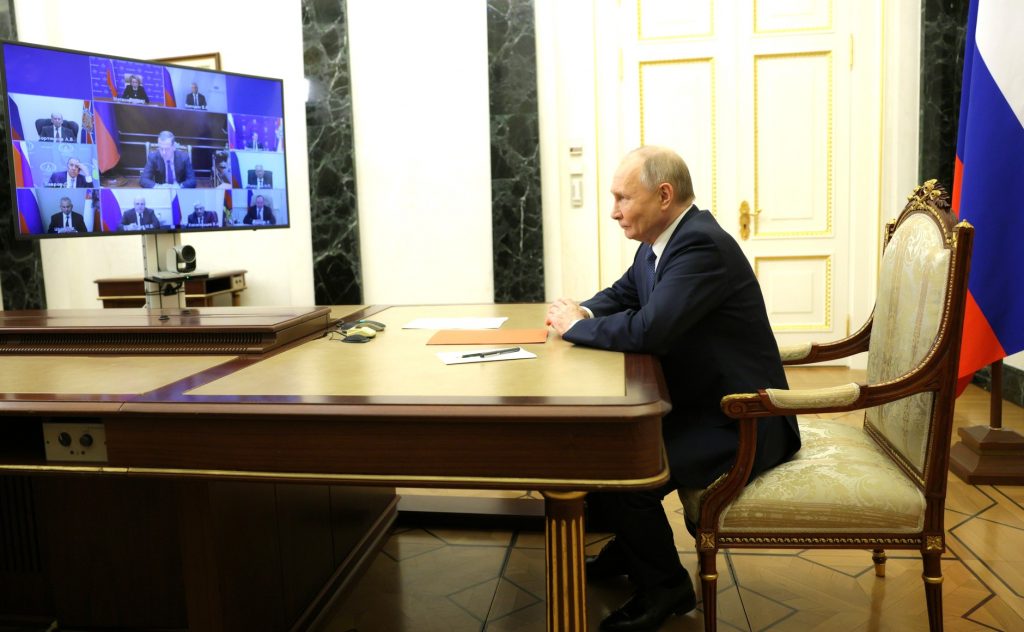
On Monday, May 13, Vladimir Putin held a traditional online meeting with permanent members of the Security Council. According to official data, the main topic of the meeting was building relations with our closest neighbors, the independent states formed in the post-Soviet space.
In his opening remarks, Vladimir Putin noted that in the new political cycle Russia should pay even more attention to this and talk about how to build this work from all points of view, including organizational. Foreign Minister Sergey Lavrov was the keynote speaker at the meeting.
Totals/Predictions:
The topic of building relations with neighbors, in fact, was reduced to a discussion of the future of the CSTO and relations with Belarus, where immediately after the meeting echelons of equipment began arriving and the transfer of manpower was predicted. In other words, the topic of the nearest neighbors was of interest in a specific military-political applied sense.
- Vladimir Putin meets with commanders of troops of military districts
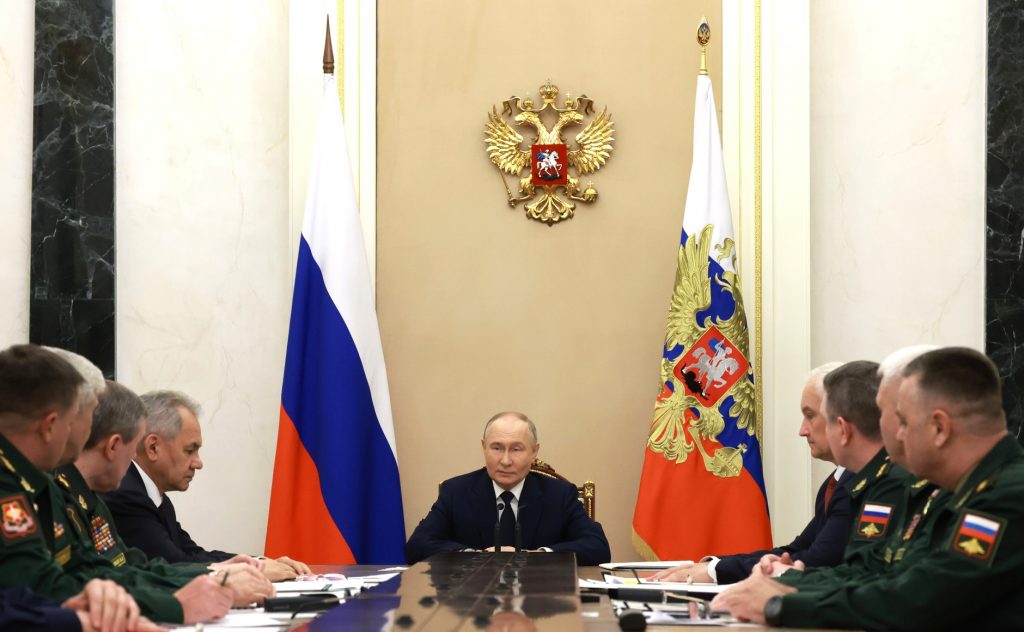
On Wednesday, May 15, Vladimir Putin held a meeting with commanders of troops of military districts. During the meeting, the Russian president congratulated the participants on May 9, discussed topical issues concerning the situation at the front, and introduced the new defense minister. Putin also thanked Sergei Shoigu for his work, noting that his experience would come in handy in his new position.
Key Abstracts:
- Putin: “Work is proceeding according to the plan approved and prepared by the grouping’s command and the General Staff, and all the tasks set are being carried out. Not only according to the results of last year, I want to say it once again, all enemy counterattacks were repulsed, but starting this year our troops are constantly, every day, improving their position in all directions.”
- Putin: “We see what the ‘neo-Nazi regime’ is doing in the border area. This is what they have been doing for all the years since 2014, when we tried to settle this conflict by peaceful means. Nothing, unfortunately, worked out, and we had to start protecting our people in these territories with the help of the Armed Forces. But the more effectively you work on the line of contact, the more chances we have to resolve this issue peacefully. This is what we have always strived for, and I have always said so.
- Putin: “I would like to thank Sergei Shoigu for what he has done over the previous years to build the Armed Forces and give them a new look. I think that no one has any doubts that this image is being consistently created, including in relation to the requirements of today, to the requirements of modern methods of armed combat.
- Putin: “Andrei Removich Belousov has been appointed as the new Minister of Defense. This is connected not least with the fact that military spending is on the rise. Let me remind you that in the mid-1980s, the Soviet Union’s combined defense and security spending was about 13 percent. In 2024, the current year, we will have combined defense and security spending of about 8.7 percent. Maybe it will be a little bit more. Roughly – 8.7 percent. Of course, this is not 13 percent, as it was in the Soviet Union, but it is already a significant amount, it is a great resource, and we must use it very carefully and effectively.
- Putin: “In addition to his duties as Secretary of the Security Council, the Minister of Defense, who has left this post, will also lead the Military Industrial Complex Commission, which functions under the President, and will be in charge of organizing the work of the Federal Service for Cooperation with Foreign Countries. I think that Sergei Kuzugetovich, more than anyone else, understands the need to ensure our obligations to our partners in the area of supplying arms and military equipment to foreign markets, taking into account the fact that first and foremost we must meet the needs of our Armed Forces”.
Totals/Predictions:
Putin reshuffled the troops, appointing new commanders and making horizontal transfers of the army’s top commanders. In his opinion, generals should not be allowed to linger in one area. First of all, the rotations are designed to prevent conspiracies, as well as to improve the quality of command (Putin looks at the effectiveness of this or that general). Interestingly, Putin did not go to the Defense Ministry board. The collegium was conducted by General Gerasimov, the chief of the General Staff. The reason is probably that Putin did not want to meet with the deputy defense ministers and heads of the ministry’s departments. Putin invited the commanders of the military districts, the chief of the General Staff and his deputy Teplinsky to the Kremlin. There he introduced the new defense minister, Andrei Belousov, and announced that General Gerasimov would retain the leadership of the General Staff and staff rotations. According to Putin, Belousov as head of the Russian Defense Ministry should continue what he has been doing all his life – economics. Putin also said that his aide Alexei Dyumin will be in charge of assisting the government and companies in providing the Armed Forces with combat equipment. Previously, Dmitry Medvedev was responsible for this. Gen. Kuzovlev, former commander of the Southern Military District, has been appointed commander of the Moscow Military District. Kuzovlev had previously commanded the Western Military District. General Nikiforov, commander of the Western Military District, has been appointed head of the main headquarters of the ground forces. General Anashkin was appointed acting commander of the Southern Military District. He headed the contingent in Nagorno-Karabakh and commanded the 8th Guards All-Russian Army. General Alexander Sanchik, who previously commanded the headquarters of the Eastern Military District, was appointed commander of the Eastern Military District. General Rustam Muradov was retired.
- Meeting on the development of the defense industry complex
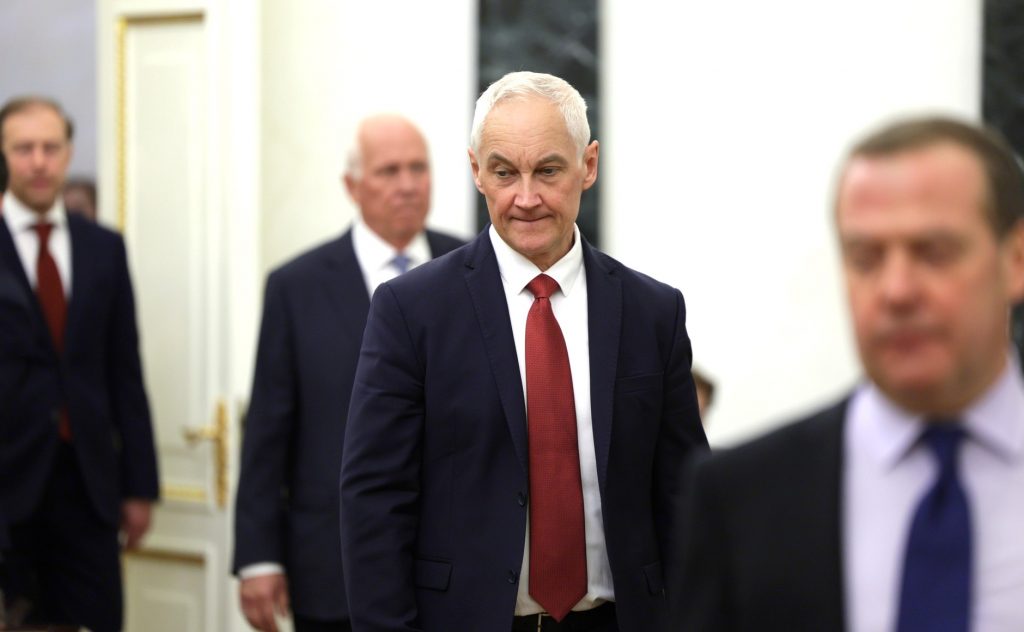
On Wednesday, May 15, Vladimir Putin held a meeting on the development of the defense industry complex. The main topic of the meeting was to ensure the Russian Armed Forces’ needs for effective work in the combat contact zone within the framework of the so-called “Strategic Defense Forces”.
Deputy Chairman of the Security Council Dmitry Medvedev, Secretary of the Security Council Sergei Shoigu, First Deputy Prime Minister Denis Manturov, Presidential Aide Alexei Dyumin, Defense Minister Andrei Belousov, Minister of Industry and Trade Anton Alikhanov, Director General of Rostec State Corporation Sergei Chemezov.
Key Abstracts:
- Putin: “A lot has been done, and more needs to be done to develop defense industries, but these enterprises are also continuing their work on diversification. Without any exaggeration, we must be ready at any moment for the fact that these enterprises, which have already done a lot, achieved a lot in accordance with our plans, must take additional steps in this direction, they must be ready to switch to the production of civilian products in an even greater volume”.
- Putin: “In order to solve these tasks, well-known personnel changes have been made. Sergei Kuzugetovich Shoigu knows the needs of the Armed Forces like no one else. From his position as Secretary of the Security Council, he will be involved in the work of the Military Industrial Complex Commission, he will work with our foreign partners to fulfill our contractual obligations to supply arms to our partners in foreign countries, and in general, I hope, he will contribute to the coordination of the work of the security services.
- Putin: “It is for this purpose that Denis Valentinovich Manturov, who deals with industry, has been appointed First Deputy Prime Minister. This was done in order to show the importance of the direction he has been engaged in over the past few years and is engaged in now.”
- Putin: “We have said this many times: whoever is quicker to master the latest means of armed struggle wins. We must be one step ahead. We have everything we need for this, and a lot has been done for this in recent years. We need to double and triple our efforts in this area.
- Putin: “I am very much counting on the fact that everything that has been done, all these personnel movements should not be formal. We must, I repeat once again, make maximum use of all our administrative resources to ensure the main task – the successful work of our combat units on the line of contact as part of the special military operation. The guys are fighting, fighting well, successfully, they are improving their situation all along the front line, it is happening every day. We must do everything that depends on us to ensure that they have everything they need to continue solving their tasks.
Totals/Predictions:
New tasks have been set before the Russian defense complex. Obviously, this is about optimizing defense spending and introducing new systems, many of which have not even undergone practical tests (the war with Ukraine allows new weapons to be tested directly in combat conditions, thus reducing the time required to pass all approvals). According to available information, the defense sector representatives were tasked with reducing regulations and thus saving money (previously, it was regulations that “ate” part of the budget and also created a field for corruption). Obviously, the innovations will lead to a serious increase in discontent among the generals and those responsible for defense orders.
- Telephone conversation between Vladimir Putin and President of Kazakhstan Kassym-Jomart Tokayev
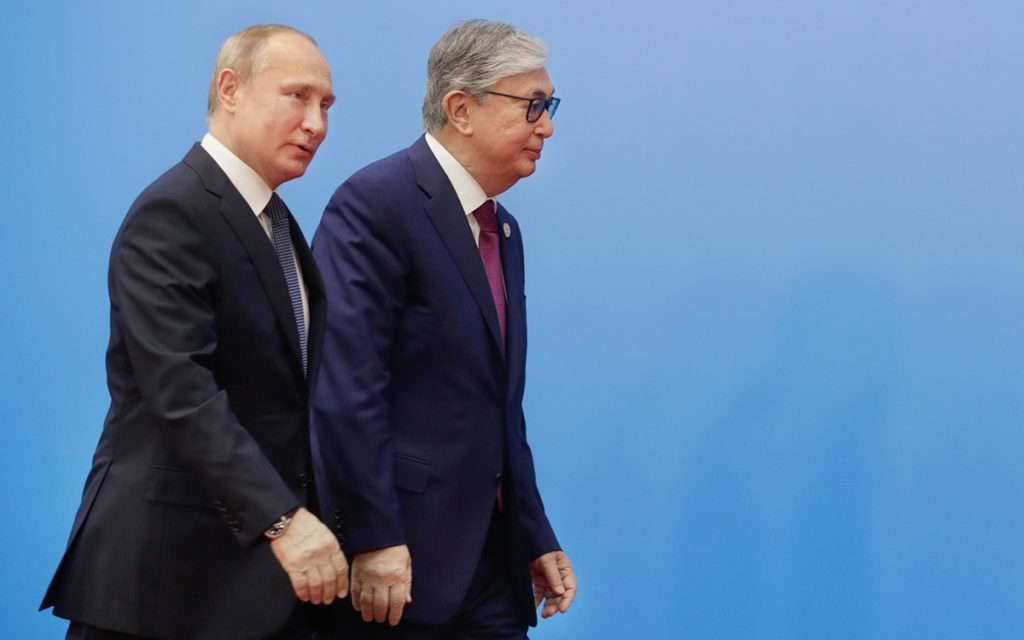
On Saturday, May 18, at the initiative of the Russian side, Vladimir Putin held a telephone conversation with the President of Kazakhstan Kassym-Jomart Tokayev. During the conversation, the Russian president congratulated his counterpart on the past birthday, which was the official reason for communication. At the same time, it is noted that during the conversation the sides touched upon some issues of bilateral cooperation and upcoming contacts in various formats. Against the background of aggravation of the internal political situation in Kazakhstan, it can be assumed that this conversation had more specific purposes.
Totals/Predictions:
The formal occasion (Tokayev’s birthday) provided an opportunity to discuss issues related to the security of Kazakhstan and the region – especially against the backdrop of new unrest in Mangistau Oblast, the subversive work of a network of Western agents and personnel changes in Kazakhstan.
- Vladimir Putin’s meeting with Alexander Kurenkov and Alexander Kozlov
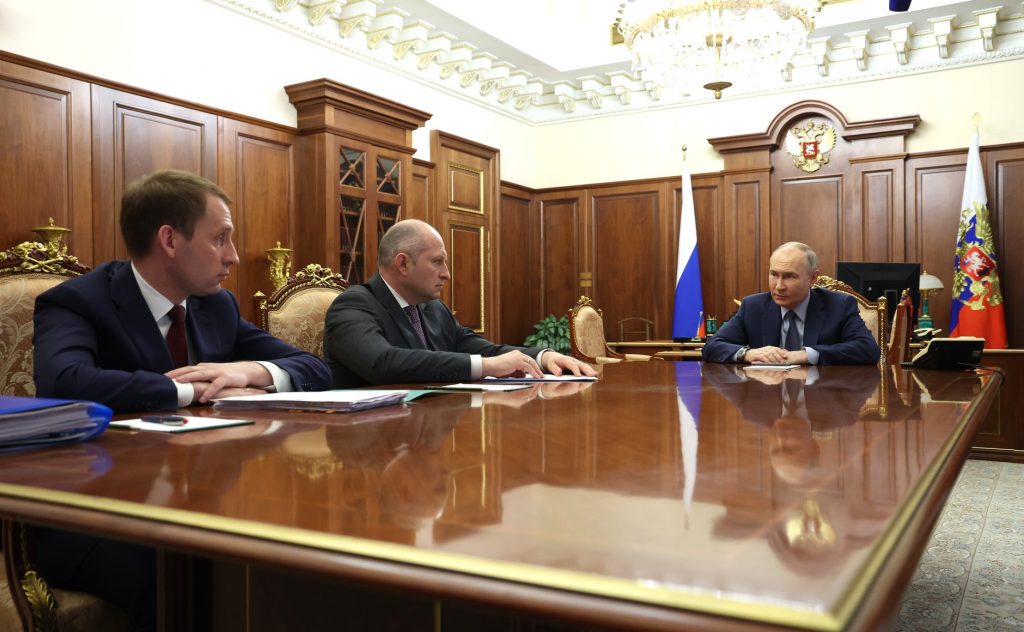
On Saturday, May 18, amid ongoing natural disasters in a number of Russian regions caused by floods, Vladimir Putin held a working meeting with Minister for Civil Defense, Emergencies and Disaster Management Alexander Kurenkov and Minister of Natural Resources and Ecology Alexander Kozlov.
During the meeting, reports were heard on the situation with floods and natural fires in the regions, as well as on measures to prevent and eliminate the consequences of natural emergencies in certain constituent entities of the Russian Federation.
Key Abstracts:
- Kurenkov: “Spring flooding in the Russian Federation continues. As of today in ten subjects of the Russian Federation, in 117 settlements 1373 residential houses, 5892 summer houses, 10720 household plots, 29 low-water bridges, 84 sections of highways and 11 socially important objects have been flooded”.
- Kurenkov: “In the Orenburg region, 232 residential houses, 272 household plots, 8 low-water bridges and 11 road sections remain flooded in two settlements. A total of 17800 people were evacuated, including 4947 children. Of these, 282 people, including 51 children, were placed in seven TACs.
- Kurenkov: “In Kurgan region 164 residential and 5542 dacha houses, 5786 household plots, four low-water bridges and 12 road sections remain flooded in four settlements. The level of the Tobol River in the city of Kurgan is 632 centimeters, a decrease of 10 centimeters per day”.
- Kurenkov: “In the Tyumen Region, 285 residential and 347 dacha houses, 3,209 household plots, ten low-water bridges, 38 road sections and four socially important objects remain flooded in 43 settlements. Thanks to coordinated actions we managed to prevent flooding of the federal highway R402 Tyumen-Omsk”.
- Kozlov: “In addition, in Yakutia we have the Lena, Aldan, Vilyui and Kolyma rivers opening up, and short-term ice jams are forming – from several hours to a day. There colleagues – regional leaders together with the Ministry of Emergency Situations are blasting, and we predict that this will last until June 12 at the most.”
- Kozlov: “In the second half of May and June in the North Caucasus and in the Southern Federal District, precipitation will begin to fall in the mountains, and there will be a sharp rise in the water level in mountain rivers, it will happen in hours. We discussed with Alexander Vyacheslavovich [Kurenkov] at the government commission: it is necessary to check river beds, underbridges, low-water bridges, dams for the presence of culverts on these rivers and take measures accordingly. There is still time, the rivers have been identified, the settlements are all clear – this is traditional”.
- Kozlov: “As for the forest fire situation: since the beginning of the year to date it is the lands of the forest fund, which we control, almost 400 thousand hectares have been covered by fires. In 2023 on this date the figure was 895 thousand, that is, we have a good positive dynamics”.
Totals/Predictions:
A working meeting on the eve of summer, which promises to bring new natural disasters and fires. Russia decided to be proactive and develop a set of preventive measures to avoid disasters. Especially since Russia is sure that Ukrainian saboteurs will increase the number of forest fires in the summer. Thus, the meeting was of a practical nature.

